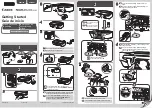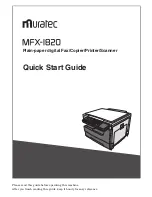
General information
The Lexmark
TM
MS315, MS415, and M1140+ are network
‑
capable, multi
‑
function laser printers that print monochrome
print jobs. All information in this service manual pertains to all models unless explicitly noted.
The printers are available in the following models:
Model
Configurations
Machine type / model
MS315dn
Network (Gigabit), Duplex printer
4514
‑
335
MS415dn
Network (Gigabit), Duplex printer
4514
‑
530
M1140+
Network (Gigabit), Duplex printer
4514
‑
539
The diagnostic information in this manual leads you to the correct field replaceable unit (FRU) or part. Use the error
code charts, symptom index, and service checks to determine the symptom and then repair the failure. After you
complete the repair, perform tests as needed to verify the repair.
To begin diagnosing a problem, go to
“Diagnostic information” on page 31
. See
“Repair information” on page 143
for information about removing and reinstalling parts. See
“Parts catalog” on page 254
to help identify parts.
Media guidelines
Paper guidelines
Selecting the correct paper or specialty media reduces printing problems. For the best print quality, try a sample of the
paper or specialty media before buying large quantities.
Paper characteristics
The following paper characteristics affect print quality and reliability. Consider these characteristics when evaluating
new paper stock.
Weight
The printer trays can automatically feed paper weights up to 90
‑
g/m
2
(24
‑
lb) bond grain long paper. The multipurpose
feeder can automatically feed paper weights up to 163
‑
g/m
2
(43
‑
lb) bond grain long paper. Paper lighter than
60 g/m
2
(16 lb) might not be stiff enough to feed properly, causing jams. For best performance, use 75
‑
g/m
2
(20
‑
lb)
bond grain long paper. For paper smaller than 182 x 257 mm (7.2 x 10.1 inches), we recommended to use 90 g/m
2
(24 lb) or heavier paper.
Note:
Two
‑
sided printing is supported only for 60–90
‑
g/m
2
(16–24
‑
lb) bond paper.
Curl
Curl is the tendency for paper to curl at its edges. Excessive curl can cause paper feeding problems. Curl can occur after
the paper passes through the printer, where it is exposed to high temperatures. Storing paper unwrapped in hot, humid,
cold, or dry conditions, even in the trays, can contribute to paper curling prior to printing and can cause feeding
problems.
4514
General information
21
Summary of Contents for M1140
Page 18: ...4514 18 ...
Page 20: ...4514 20 ...
Page 142: ...4514 142 ...
Page 197: ...b Set the spring over the plunger 4514 Repair information 197 ...
Page 204: ...3 Squeeze the latches B to release the left and right links B 4514 Repair information 204 ...
Page 228: ...10 Remove the screw C and then detach the trailing edge sensor A 4514 Repair information 228 ...
Page 229: ...11 Disconnect the two springs D 4514 Repair information 229 ...
Page 246: ...3 Swing the right cover backward to remove 4 Remove the screw D 4514 Repair information 246 ...
Page 248: ...4514 248 ...
Page 253: ...4514 253 ...
Page 255: ...Assembly 1 Covers 4514 Parts catalog 255 ...
Page 257: ...Assembly 2 Electronics 1 4514 Parts catalog 257 ...
Page 259: ...Assembly 3 Electronics 2 4 3 2 1 6 5 4514 Parts catalog 259 ...
Page 261: ...4514 Parts catalog 261 ...
Page 262: ...Assembly 4 Frame 4514 Parts catalog 262 ...
Page 264: ...4514 Parts catalog 264 ...
Page 265: ...Assembly 5 Option trays 3 4 5 6 1 2 4514 Parts catalog 265 ...
Page 268: ...4514 Parts catalog 268 ...
Page 270: ...4514 270 ...
Page 274: ...4514 274 ...
Page 276: ...4514 276 ...
Page 298: ...4514 Part number index 298 ...
Page 302: ...4514 Part name index 302 ...
Page 303: ......
















































